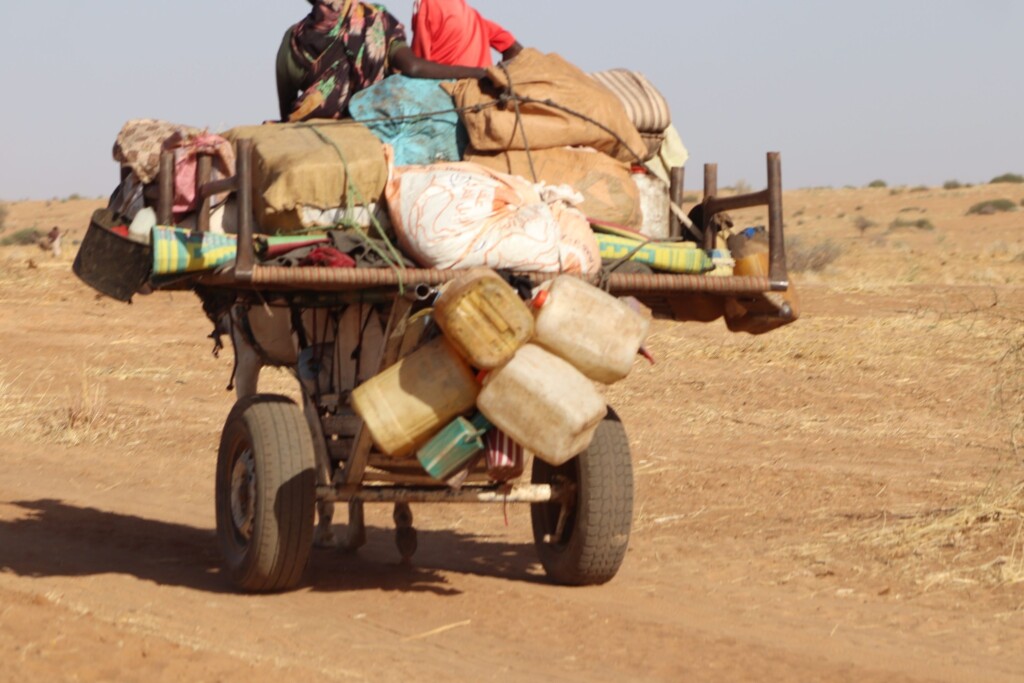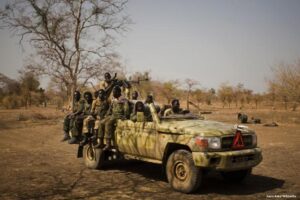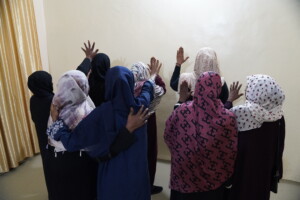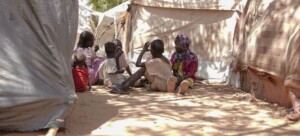Cautious calm in North Darfur amid international warnings

Displacement from villages west of El Fasher (Photo: Mohamed Jamal El Asmar)
The United Nations High Commissioner for Human Rights, Volker Türk, warned of an imminent offensive on El Fasher, capital of North Darfur, the only Darfuri capital not under control of the Rapid Support Forces (RSF). El Fasher is reportedly calm after violent confrontations erupted in the city and neighbouring Mellit last week.
In the press release, published on the first anniversary of the war in Sudan yesterday, Türk said that “the Sudanese people have been subjected to untold suffering during the conflict which has been marked by indiscriminate attacks in densely populated areas, ethnically-motivated attacks, and a high incidence of conflict-related sexual violence. The recruitment and use of children by parties to the conflict are also deeply concerning.”
A state of cautious calm returned to the capital of North Darfur yesterday after confrontations left nine dead and dozens wounded last week.
Many people were reportedly displaced from the northern and eastern neighbourhoods to the southern part of the city. Others reportedly fled from the countryside into El Fasher to escape violent confrontations between the warring parties.
From El Fasher, Activist Karar Abdelkarim told Radio Dabanga that life has almost returned to normal. He said that the livestock market and El Fasher Grand Market are operating again, along with public transport.
About 90 per cent of the population has left the north of El Fasher, according to Abdelkarim. The newly displaced have sought refuge in crowded shelter centres and schools, some of them have rented houses or have moved in with host families, while others now live on the streets.
Recruitment and rebels
Türk’s press release warned of a further escalation in violence due to increased recruitment by both warring parties. “To give a peaceful resolution to the ongoing conflict a chance, a contraction rather than an expansion in the number of armed actors is needed,” he said.
Forces affiliated with the Sudan Liberation Movement breakaway faction under the leadership of Minni Minawi (SLM-MM), Justice and Equality Movement (JEM) led by Jibril Ibrahim, and Sudan Liberation Movement led by Mustafa Tambour (SLM-Tambour), are participating in the Sudanese Armed Forces (SAF) ongoing war against the RSF. In addition, there are reports that both the SAF and the RSF are now arming civilians.
Emerging division of rebel groups in Darfur between those remaining neutral to the war and others that have chosen to align themselves with the SAF has created instability in El Fasher and surrounding areas, Abdelkarim told Radio Dabanga.
The Darfur Joint Protection Force, made up of fighters of the Sudan Liberation Movement faction led by Darfur Governor Minni Minawi (SLM-MM), the Justice and Equality Movement (JEM), and smaller rebel factions that signed the Juba Peace Agreement (JPA) with the Sudanese government in October 2020, have repeatedly stressed that they will not allow the RSF to seize El Fasher and that they are there to protect the city’s residents.
The force, which is made up of members of rebel groups which announced their neutrality to the war, is “falling apart” as a result of the largest movements siding with the SAF against the RSF, according to Abdelkarim.
Battles between the rebel groups took place east and north of El Fasher and in Mellit last week, he said, explaining that “the ordinary people pay the price for their disputes. They wonder how these armed movements, who were comrades and ate from one plate and were one force, began fighting amongst themselves, with their own families.”
He explained that “many families have broken apart because of the choices of their relatives, one of whom is neutral, the other against neutrality, one of them is with the army, the other is with the RSF, and so on. This has a severely negative impact on the security and stability of North Darfur.”
Renewed SAF-RSF battles erupted in March, again prompting fears that rebel combatants would get involved in the fighting. The RSF taking full control of the city would reportedly also ignite strife between the Arab tribes supporting the RSF, and the Zaghawa tribe, from which most North Darfur rebel fighters hail, and lead to a “catastrophic bloodbath” in the area.
Arrests and detentions
The High Commissioner also decried the enduring pattern of arbitrary arrests and detention, as well as intimidation and threats against civil society representatives, human rights defenders and journalists, among others.
“Any moves to curtail the participation of civilian political leaders in the conduct of public affairs, including by threat of arrest, are counterproductive and must be abandoned,” Türk warned. “The Sudanese authorities must immediately revoke the arrest warrants against Hamdok and other civilian leaders and prioritize confidence-building measures towards a ceasefire as a first step, followed by a comprehensive resolution of the conflict and the restoration of a civilian government.”
Türk called on all parties to ensure humanitarian and human rights workers are allowed safe and unhindered access to all areas under their respective control.
They must also take meaningful steps to prevent further civilian suffering and ensure violations of international humanitarian and human rights laws are fully investigated and those found responsible held to account in fair trials and victims provided with reparations.
Since the outbreak of fighting on April 15, 2023, thousands of civilians have been killed, and many have been injured, arbitrarily detained, or are missing. Torture by both sides has also been reported, and the conflict has been called “the world’s worst, most complex and cruel crisis” by Under-Secretary-General for Humanitarian Affairs and Emergency Relief Coordinator Martin Griffiths. Thousands of homes, schools, hospitals, and other essential civilian infrastructure have been destroyed, plunging the country into turmoil and creating the world’s largest displacement crisis.











 and then
and then